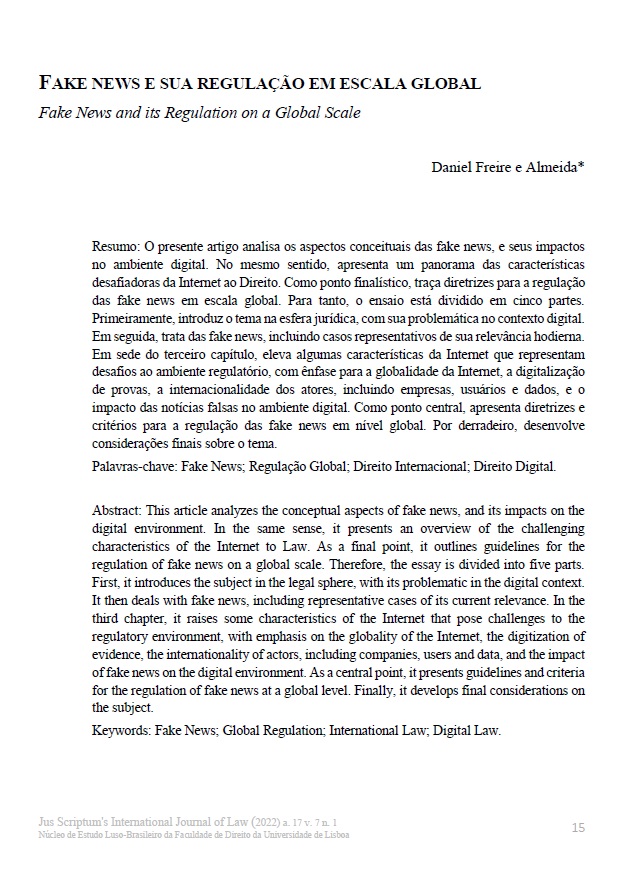Fake news e sua regulação em escala global
DOI:
https://doi.org/10.29327/238407.8.3-2Palavras-chave:
Fake News, Regulação Global, Direito Internacional, Direito DigitalResumo
O presente artigo analisa os aspectos conceituais das fake news, e seus impactos no ambiente digital. No mesmo sentido, apresenta um panorama das características desafiadoras da Internet ao Direito. Como ponto finalístico, traça diretrizes para a regulação das fake news em escala global. Para tanto, o ensaio está dividido em cinco partes. Primeiramente, introduz o tema na esfera jurídica, com sua problemática no contexto digital. Em seguida, trata das fake news, incluindo casos representativos de sua relevância hodierna. Em sede do terceiro capítulo, eleva algumas características da Internet que representam desafios ao ambiente regulatório, com ênfase para a globalidade da Internet, a digitalização de provas, a internacionalidade dos atores, incluindo empresas, usuários e dados, e o impacto das notícias falsas no ambiente digital. Como ponto central, apresenta diretrizes e critérios para a regulação das fake news em nível global. Por derradeiro, desenvolve considerações finais sobre o tema.
Referências
ARMSTRONG, Paul. Disruptive Technologies. A Framework to Understand, Evaluate and Respond to Digital Disruption. Kogan Page, 2023.
BASTOS, Alder Thiago. O Reconhecimento da Dimensão Autônoma do Meio Ambiente Digital em um Contexto Global. New York: Lawinter Editions, 2023.
BECKERS, Anna; TEUBNER, Gunther. Three Liability Regimes for Artificial Intelligence Algorithmic Actants, Hybrids, Crowds. Bloomsbury Publishing, 2021.
COMMUNICATIONS DECENCY ACT OF 1996. United States Code/Title 47/Chapter 5/Subchapter II/Part I/Section 230. Disponível em: https://transition.fcc.gov/Reports/tcom1996.txt .
COUNCIL OF EUROPE. Convention on Cybercrime, Budapest, 2001. Disponível em: https://rm.coe.int/CoERMPublicCommonSearchServices/DisplayDCTMContent?documentId=0900001680081561 .
COURT OF JUSTICE OF THE EUROPEAN UNION. Statement on the Court of Justice of the European Union Judgment in Case C-311/18 - Data Protection Commissioner v Facebook Ireland and Maximillian Schrems. Disponível em: https://edpb.europa.eu/our-work-tools/our-documents/other-guidance/statement-court-justice-european-union-judgment-case-c_pt .
EUROPEAN COMMISSION. Shaping Europe’s digital future. Disponível em: https://digital-strategy.ec.europa.eu/en .
EUROPEAN PARLIAMENT. The use of Facebook users’ data by Cambridge Analytica and the impact on data protection. European Parliament resolution of 25 October 2018 on the use of Facebook users’ data by Cambridge Analytica and the impact on data protection (2018/2855(RSP)). Disponível em: https://eur-lex.europa.eu/legal-content/EN/TXT/PDF/?uri=CELEX:52018IP0433 .
FEDERAL TRADE COMMISSION. FTC Imposes $5 Billion Penalty and Sweeping New Privacy Restrictions on Facebook. 2019. Disponível em: https://www.ftc.gov/news-events/news/press-releases/2019/07/ftc-imposes-5-billion-penalty-sweeping-new-privacy-restrictions-facebook .
FILIMOWICZ, Michael. Deep Fakes. Algorithms and Society. New York: Routledge, 2022.
FREIRE E ALMEIDA, D. A Responsabilidade das Redes Sociais sobre as Fake News. in: Daniel Freire e Almeida. (Org.). Os Cybercrimes na Perspectiva do Direito Internacional na Internet. New York: Lawinter Editions, 2020, v. 1, p. 145-182.
FREIRE E ALMEIDA, Daniel. Fake News and The Liability of Social Networks. Revista Científica sobre Cyberlaw do Centro de Investigação Jurídica do Ciberespaço – CIJIC – da Faculdade de Direito da Universidade de Lisboa - Portugal. Lisboa: Cyberlaw, Edição N.º X – Setembro de 2020, p. 203/219.
FREIRE E ALMEIDA, Daniel. International Law under a new Digital Dimension. CIFILE- Canadian Journal of International Law. Volume 1, Issue 1, Summer 2019. Disponível em: http://www.cifilejournal.com/article_94053_950bffb78a3daaf441afc9fdd284653c.pdf .
FREIRE E ALMEIDA, Daniel. Trump vs Twitter: "Ninguém está imune à lei". Liberdade de expressão "não está acima de crimes" e as redes sociais "não são imunes à lei". Rádio Observador, Portugal, 2020. Disponível em: https://observador.pt/programas/resposta-pronta/trump-vs-twitter-ninguem-esta-imune-a-lei/
FREIRE E ALMEIDA, Daniel. Um Tribunal Internacional para a Internet. São Paulo: Almedina, 2015.
https://www.unoosa.org/oosa/oosadoc/data/documents/2017/stspace/stspace61rev.2_0.html .
KAISER, Brittany. Targeted. The Cambridge Analytica Whistleblower's Inside Story of how Big Data, Trump, and Facebook Broke Democracy and how it Can Happen Again. HarperCollinsPublishers, 2019.
KAREY, Kelly. Fake News. How Propaganda Influenced the 2016 Election, a Historical Comparison to 1930's Germany. Marzenhale Publishing, 2017.
KIRCH, Vanessa. Social Networks - The Modern-Day Family: Law and Policy of Law and Policy of Regulation. Swiss: Springer, 2022.
KUYPERS, Jim A. The 2016 American Presidential Campaign and the News: implications for American Democracy and Republic. New York: Lexington Books, 2018.
LEITE DE CAMPOS, Diogo. A Internet e o Princípio da Territorialidade dos Impostos. Lisboa: Revista da Ordem dos Advogados, ano 58, 1998, p. 640.
LESSIG, Lawrence. Code. Version 2.0. New York: Basic Books, 2006.
ORGANIZAÇÃO DAS NAÇÕES UNIDAS. Brasileiro defende Tribunal para a internet. New York: ONU News, 2012. Disponível em: https://news.un.org/pt/audio/2012/08/1040211 .
REGULATION (EU) 2016/679 OF THE EUROPEAN PARLIAMENT AND OF THE COUNCIL of 27 April 2016 on the protection of natural persons with regard to the processing of personal data and on the free movement of such data, and repealing Directive 95/46/EC (General Data Protection Regulation).
REUTERS. Facebook agrees to pay UK fine over Cambridge Analytica scandal. 2019. Disponível em: https://www.reuters.com/article/us-facebook-privacy-britain-idUSKBN1X913O .
RUBIN, Victoria L. Misinformation and Disinformation: Detecting Fakes with the Eye and AI. Swiss: Springer, 2022.
SCHUSTER, Ernest Joseph. The Principles of German Civil Law. Creative Media Partners, 2022.
SUPREME COURT OF THE UNITED STATES. REYNALDO GONZALEZ, ET AL., PETITIONERS v. GOOGLE LLC. Disponível em: https://www.supremecourt.gov/opinions/22pdf/21-1333_6j7a.pdf .
TELEGRAM. Perguntas Frequentes. Disponível em: https://telegram.org/faq .
TERRONES, Pedro Chirinos. Clickbait: Can it Be an Unfair Competition Practice? Michigan Technology Law Review. Disponível em: https://mttlr.org/2023/01/clickbait-can-it-be-an-unfair-competition-practice/ .
UNITED NATIONS OFFICE FOR OUTER SPACE AFFAIRS. International Space Law: United Nations Instruments. Disponível em:
UNITED NATIONS. Transforming our world: the 2030 Agenda for Sustainable Development. Resolution adopted by the General Assembly on 25 September 2015. A/RES/70/1. New York: United Nations, 2015.
UNITED NATIONS. UN’s rights council adopts ‘fake news’ resolution, States urged to tackle hate speech (2022). Disponível em: https://news.un.org/en/story/2022/04/1115412 .

Publicado
Como Citar
Edição
Seção
Licença
Copyright (c) 2024 Jus Scriptum's International Journal of Law

Este trabalho está licenciado sob uma licença Creative Commons Attribution-NonCommercial-NoDerivatives 4.0 International License.

